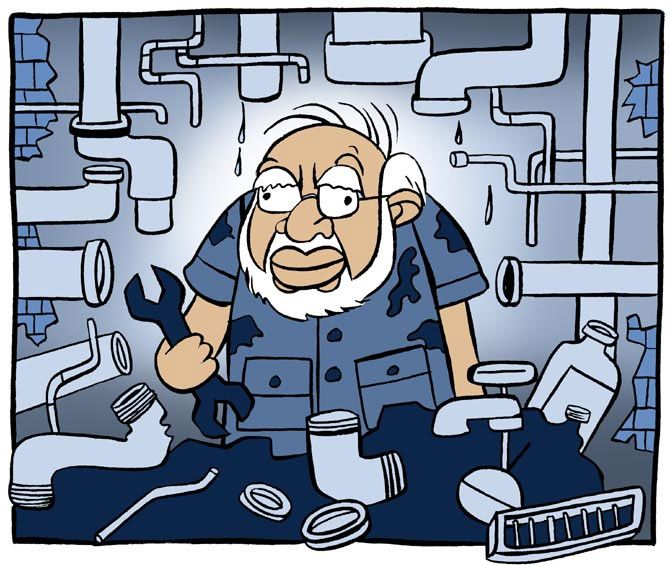'Demonetisation will push India onto a higher growth path after a temporary dip.'

Illustration: Uttam Ghosh/Rediff.com
The markets have been hit by the double whammy of a surprise outcome of the US presidential elections and the government's demonetisation move back home.
Jan Dehn, head of research at the UK-based Ashmore Investment Management that manages nearly $55 billion in assets across markets, tells Puneet Wadhwa/Business Standard that demonetisation will push India onto a higher growth path after a temporary dip.
Investors, Dehn says, should use the fall in stock prices to buy.
How does India appear as an investment destination now given the global developments and the demonetisation move by the Indian government?
I am extremely excited by the opportunity right now.
Asset prices across the board have suddenly cheapened for reasons that are clearly temporary, namely the demonetisation process and the uncertainty caused by Donald Trump's election.
Trump's election has unleashed considerable uncertainty, but the uncertainty is bound to decrease quite quickly, while the demonetisation process will actually lead to a stronger economy over time.
It is not often that investors get opportunities like this and it is imperative to buy during this ongoing volatility, which offers a superb entry point.
Do you think the demonetisation move could have been planned better, perhaps done at a time when there was better financial inclusion?
No. There is never an ideal time for reforms, there are always good short term political arguments for delaying reforms.
But delaying is a slippery slope, because in the end reforms never get done at all.
India is now doing what China is doing -- reforming all the time. This is the right approach.
For a fast growing economy like India it is crucial that the government -- and society at large -- get used to the idea that reforms need to be done all the time.
This is the only way that the constraints to India's continued progress can be lifted.
I wholeheartedly applaud the government's aggressive approach and soon it will become evident that action was better than delay.
Do you foresee a setback to pick-up in corporate earnings given these developments?
There may be a setback to earnings, but it will strictly be temporary and once the transitory effect is over the earnings outlook will rise to higher levels than would have been the case without demonetisation.
The demonetisation process will increase formalisation of the economy, which in turn will improve financial intermediation.
In other words, savings will be channelled to investment opportunities more efficiently, which is clearly good for the structural growth rate of the country.
There will also be a boost coming from lower interest rates and finally there will be fiscal benefits as the tax base is broadened.
Demonetisation will only hurt on a permanent basis those people who choose to transact into false currency.
This is a good thing. They have suffered a 100 per cent loss of principal on their wealth, so the deterrent effect is powerful.
Which sectors are you overweight and underweight on now?
Demonetisation will push India onto a higher growth path after a temporary dip.
This suggests that the right sectors to add right now are the most cyclically sensitive stocks, notably banks and large-ticket consumer durables and other sectors that are being liquidated right now.
Buy this dip. If you are already long, the cyclical stocks -- which I think investors should be -- then use this opportunity to add further.
The key to making money in a temporary downturn is to add during the lows to ensure you carry a bigger position out of the dip than the position you carried into the dip.
Are the markets factoring the possibility of a slowdown in economic growth in at the current levels?
The market is over-stating the effects of demonetisation, not least because it is taking place at the same time as negative risk sentiment towards emerging markets in global markets due to Trump's election.
Markets are already pricing in far too gloomy an outlook.
I expect a strong performance for Indian and EM (emerging markets) assets already starting early next year.
The biggest risk facing investors is that they miss the opportunity to add during this dip by being far too myopic, herd-driven and cautious.
India is a strong story built on reforms, and it has legs too.
How do you see the Reserve Bank of India respond to the developments in terms of a cut in key rates over the next few quarters?
Where is the Indian rupee headed over the next three to six months?
INR will rally from current lows over the next six months.
The USD is being seriously overbought as markets price in an irrationally exuberant outlook for the US economy.
Trump is a populist and the Fed is behind the curve as inflation beckons, so the risk for next year is that the USD falls from current overbought levels.
The RBI will cut rates, so we are looking at Goldilocks in the next year or so -- appreciating INR, falling rates and a recovery in economic activity.
Is a rate hike by the US Fed in December on the cards?
The US Fed hikes on December 14. It is priced and will have no effect on the market.
The biggest risk by far is the return of inflation in the US and the resulting impact on the USD and the US yield curve.
Never in the history of the United States has the US Fed allowed the economy to reach full employment with only one hike on its books.
Since the Fed cannot hike the eight times it would take just to get to a non-negative policy rate we are looking at a situation where inflation rises faster than interest rates, or, put differently, real rates fall.
And that is why the USD falls.
This could be disruptive since positions are very long.
The sharp bear steepening of the yield curve could trigger a US recession.
The US economy is very heavily indebted.
Rising real yields hurt housing -- and Trump is a housing guy.
An economy is always closest to recession when it is at full employment.
A recession would hit US stocks hard.
The best way to protect against all these risks is to hide in EM, where you get paid more, where there are reforms instead of populism and where central banks have meaningful room to cut rates of growth slows.
You take less risk and get paid better.












 © 2025 Rediff.com -
© 2025 Rediff.com -